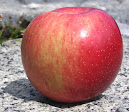Although this word is sometimes just a synonym for apple, especially one that is green and tart, pippin's pomological meaning is an apple grown from seed. Not grafted. Wild, even
 |
(It also is slang for a person or thing that is exemplary, a corker, a right good one. Another meaning is just a pip, a seed.)
In its apple sense pippin is the opposite of the word cultivar, a plant variety developed and propagated via human cultivation.
Simple enough, if you don't look too closely. But think about it and your brain will itch. Because those pippins we know and love? They are all propagated by grafting.
Cox's Orange Pippin grew from seed, but today it is a cultivar.
Newtown Pippin, cultivar.
Reine de Reinette ("Reinette" is French for "Pippin"): cultivar.
Since apple varieties do not breed true from seed, they can only be conserved by agriculture. Otherwise each tree is a one-off and its entire variety becomes extinct with the tree's death.
Similarly: are there any varieties that were not, originally, grown from seed? (Please note this is a rhetorical question.)
The Oxford English Dictionary lists as one definition "the name of numerous varieties of apple, raised from seed," citing among other examples the following usage from 1432:
Pypyns, quynces blaundreys to dispot
And þe Pom cedre corageus to recomfort. (John Lydgate, "On Entry of Henry VI into London")
Ah, Pom cedre! Apples are widely grown for cider, pippins of no special lineage sprung from seed. Not sweet cider: the hard stuff.
 |
| Johnny Appleseed (public-domain image) |
John Chapman, as Johnny Appleseed, is famous for sowing cider pippins across a swath of what was then the U.S.
Here in the States the distinction between desert-apple cultivars and the spitters for cider (you wouldn't want to eat them) must have been meaningful through Prohibition.
Think on that, gentle reader, perhaps with a glass of Pom cedre in hand. The natural utility of the pippin-cultivar distinction grows clearer from that vantage point.
All cultivars may once have been pippins, but not all pippins become cultivars.
Things grow a little less clear when a chance pippin is tasty enough to be grafted—to graduate to cultivar.
Naming an apple "Pippin" is like naming your infant child "Baby." How does that work out once the kid has pippins of his own?

gday adam, I think you might find that in the early days before grafting some of these classic old varieties were grown from seed for commerce - those esteemed varieties which bred reasonably true and consistent became known as a "pippin" variety or lineage.
ReplyDeleteNot 100% about this but pretty sure
Cheers
Matty B
Matty, that is an interesting thought, thanks! What would grow if I planted Cox's pips, I wonder.
ReplyDeleteHowever, grafting is an ancient art--it certainly predates the word "pippin" (and indeed most modern languages).
Perhaps in the old days people were lots more tolerant of variation, so maybe some "varieties" that bred truer (if not strictly true) were propagated from seed.
I have a vast collection of "pips" or seeds. I save all seeds from interesting or noteworthy apples. Doesn't take much time, just pluck them out when you're coring your dessert fruit and label your favorites.2012 spring will start hundreds of seeds in hopes of discovering something special.
ReplyDeleteI am glad to hear you are trying this Hawk Farm. I would love to do this also, I just lack the growing space. Best of luck! I hope to try a Hawk Farm Russet someday!
ReplyDeleteHawk, this sounds like a marvelous project.
ReplyDeleteI am reminded of John Seabrook's description of UMinn's David Bedford, playing God to all those new apple varieties with his can of orange spray paint. One strike and you're out.
Can you be as cold-blooded as he? (Just kidding. I think.)